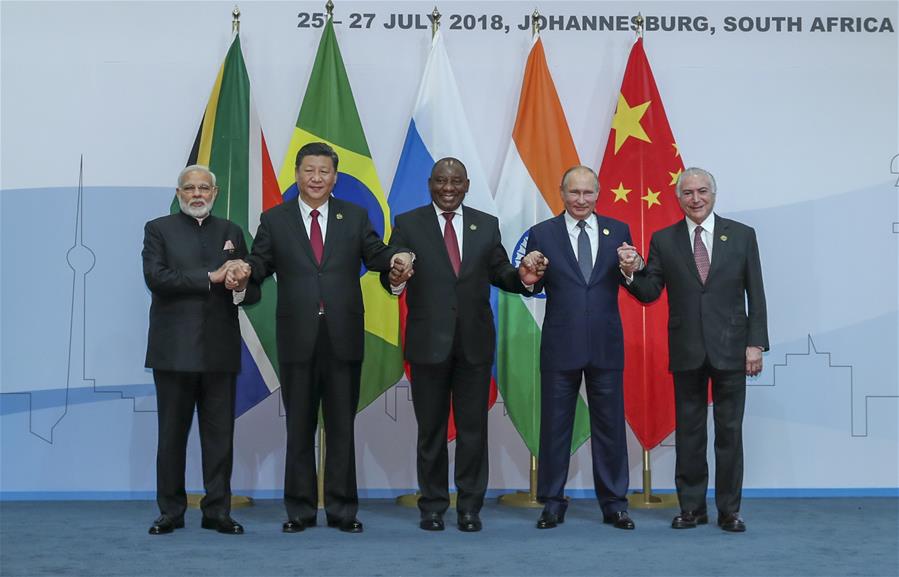Int’l Community Eyes Outcomes of BRICS Summit in Johannesburg
BRICS, 30 Jul 2018
Xinhua News – TRANSCEND Media Service

Chinese President Xi Jinping (2nd L), Brazilian President Michel Temer (1st R), Russian President Vladimir Putin (2nd R), Indian Prime Minister Narendra Modi (1st L) and South African President Cyril Ramaphosa pose for a group photo during the Plenary Session of the 10th BRICS summit in Johannesburg, South Africa, July 26, 2018. (Xinhua/Xie Huanchi)
28 Jul 2018 – The 10th summit of Brazil, Russia, India, China and South Africa, or collectively BRICS, was held in Johannesburg from Wednesday to Friday [25-27 Jul], with the Johannesburg Declaration issued, mapping out a blueprint for the emerging-market bloc’s second “Golden Decade.”
The international community highly regarded the outcomes of the summit, saying that this summit marks that the BRICS countries are taking new steps in strengthening innovation and industrialization, sending a clear message for defending multilateralism and opposing trade protectionism, and it will further BRICS cooperation and play a key and positive role in boosting the world economic growth and improving global governance.
“For the BRICS as a whole, the strong emphasis on technology and the impact on manufacturing and employment was key in driving the group’s agenda forward,” said Cyril Prinsloo, a researcher at the South African Institute of International Affairs.
“There have been several important outcomes at this summit,” said Alissa Xinhe Wang, chair of BRICS Research Group based at the University of Toronto in Canada, adding that the establishment of the BRICS Partnership on New Industrial Revolution is a firm step made by the BRICS to catch the opportunities brought by the Fourth Industrial Revolution.
The BRICS mechanism has played a positive role in boosting the BRICS countries’ economies and international trade, said Ronnie Lins, director of the China-Brazil Center for Research and Business.
The BRICS countries enjoy increasingly closer cooperation in financial and economic realms, with the economic cooperation remaining the focus, Lins said.
They will play a more important role in boosting global economic growth and establishing a new world financial and economic order in the future, he said.
In the Johannesburg Declaration issued on Thursday, BRICS leaders said that they will join hands to strengthen multilateralism and push for a fairer, more equal, more democratic and more representative world order.
Prinsloo believed that the Johannesburg Declaration reiterated the BRICS stance on the World Trade Organization (WTO) and expressed the BRICS resolve to strengthen the multilateral trade regime, which “signifies the BRICS intent in the face of increasing protectionism that threatens the global trading regime.”
“Over the past decade, the cooperation has matured and deepened. Presenting a unified voice and agenda on key issues impacting not only on BRICS, but equally (for) all countries globally, illustrates the BRICS’ commitment to forging a better world,” Prinsloo said.
It is encouraging that the BRICS countries have expressed their voice and joined hands to face challenges, said BRICS Business Council Co-Chair Onkar Kanwar.
BRICS Business Council Chair Iqbal Surve said that it is worrying that some countries install trade barriers and this act not only snuffs out healthy enterprises, but also hurts the ordinary people.
The BRICS Summit in Johannesburg has shown the world that the BRICS countries unanimously oppose trade protectionism and remain a powerful force for maintaining the multilateral trade system, Surve said.
Lins said that the BRICS countries have changed the long-standing dominance over the world by developed countries, and they also create a successful case for the developing countries to seek economic cooperation and enhance international influences.
Somadoda Fikeni, a political analyst with the University of South Africa, said that the BRICS Summit hosted by the African continent “means Africa is not going to be marginalized and its value will start being recognized.”
Fikeni expected that the BRICS’ New Development Bank will play a major role in the infrastructure development in Africa.
Nele Noesselt, a German professor at the University of Duisburg-Essen, said that this year’s BRICS Summit focused not only on the interests of emerging economies, but also on those interests of other countries.
When the global governance runs into problems, the BRICS countries can put forward some new ideas and measures to improve it and that will play a constructive role in reforming the global governance, Noesselt said.
_________________________________________________
Editor: Mu Xuequan
Go to Original – xinhuanet.com
DISCLAIMER: The statements, views and opinions expressed in pieces republished here are solely those of the authors and do not necessarily represent those of TMS. In accordance with title 17 U.S.C. section 107, this material is distributed without profit to those who have expressed a prior interest in receiving the included information for research and educational purposes. TMS has no affiliation whatsoever with the originator of this article nor is TMS endorsed or sponsored by the originator. “GO TO ORIGINAL” links are provided as a convenience to our readers and allow for verification of authenticity. However, as originating pages are often updated by their originating host sites, the versions posted may not match the versions our readers view when clicking the “GO TO ORIGINAL” links. This site contains copyrighted material the use of which has not always been specifically authorized by the copyright owner. We are making such material available in our efforts to advance understanding of environmental, political, human rights, economic, democracy, scientific, and social justice issues, etc. We believe this constitutes a ‘fair use’ of any such copyrighted material as provided for in section 107 of the US Copyright Law. In accordance with Title 17 U.S.C. Section 107, the material on this site is distributed without profit to those who have expressed a prior interest in receiving the included information for research and educational purposes. For more information go to: http://www.law.cornell.edu/uscode/17/107.shtml. If you wish to use copyrighted material from this site for purposes of your own that go beyond ‘fair use’, you must obtain permission from the copyright owner.